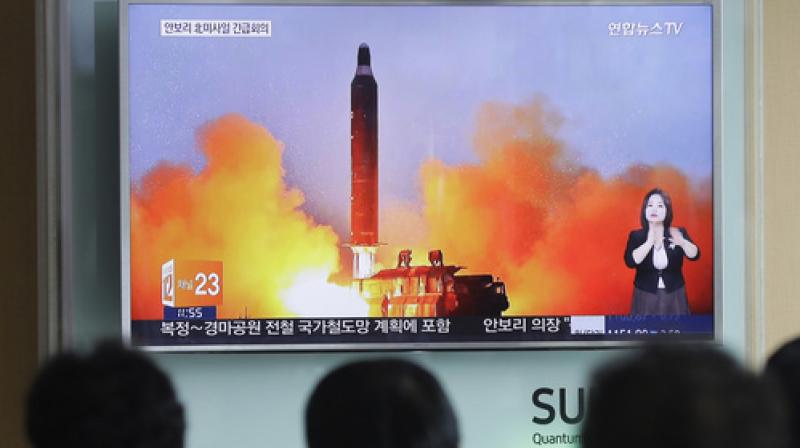North Korea fires apparent Scud-type missile into eastern waters

Seoul: North Korea fired a short-range ballistic missile that landed in Japan's maritime economic zone Monday, officials said, in the latest in a string of test launches as the North seeks to build nuclear-tipped ICBMs that can reach the US mainland.
The suspected Scud-type missile launched from the coastal town of Wonsan flew about 450 kilometers (280 miles), the South's Joint Chiefs of Staff said in a statement.
It landed in Japan's exclusive maritime economic zone, which is set about 200 nautical miles off the Japanese coast, Japanese Chief Cabinet Secretary Yoshihide Suga said. He said there was no report of damage to planes or vessels in the area.
North Korea is still thought to be several years from its goal of being able to target US mainland cities with a nuclear intercontinental ballistic missile. It has a strong arsenal of short- and medium-range missiles that could hit Japan and South Korea as well as US forces in the region, and it is working to perfect its longer-range missiles.
North Korea's state-controlled media had no immediate comment. But a day earlier, the North said leader Kim Jong Un had watched a successful test of a new type of anti-aircraft guided weapon system. It wasn't clear from the state media report when the test happened.
Kim found that the weapon system's ability to detect and track targets had "remarkably" improved and was more accurate, according to the official Korean Central News Agency.
KCNA cited Kim as ordering officials to mass-produce and deploy the system all over the country so as to "completely spoil the enemy's wild dream to command the air."
The North's nuclear and missile programs are perhaps the biggest foreign policy challenges to the new leaders in Washington and Seoul.
President Donald Trump has alternated between bellicosity and flattery in his public statements about North Korea, but his administration is still working to solidify a policy to handle its nuclear ambitions.
Monday's launch was the third ballistic missile launch by North Korea since South Korea's President Moon Jae-in was inaugurated on May 10. He has signaled an interest in expanding civilian exchange with North Korea, but many analysts say he won't likely push for any major rapprochement because North Korea has gone too far in developing its nuclear program.
Moon called a National Security Council meeting Monday morning to discuss the North's launch. In a separate statement, South Korea's Joint Chiefs of Staff warned North Korea's repeated provocation would further deepen its international isolation.
Japanese Prime Minister Shinzo Abe, who just returned from a G7 meeting in Italy, told reporters that "North Korea's provocation by ignoring repeated warnings from the international society is absolutely unacceptable."
The U.S. Pacific Command said in a statement that it tracked a short-range missile for six minutes until it landed in the Sea of Japan.
Suga, the Japanese cabinet secretary, told reporters that the missile fell about 300 kilometers (190 miles) north of the Oki islands in southwestern Japan and 500 kilometers (310 miles) west of Sado island in central Japan.
Suga said Japanese officials will discuss North Korea with a senior foreign policy adviser to Chinese President Xi Jinping, Yang Jiechi, who is scheduled to visit Japan later Monday. He said China has been increasingly stepping up and using its influence over North Korea and that the two sides will thoroughly discuss the situation.
Besides its regular ballistic missile test-launches, the North carried out two nuclear tests last year - in January and September. Outside analysts believe North Korea may be able to arm some of its shorter-range missiles with nuclear warheads, though the exact state of the North's secretive weapons program is unknown.
Despite the missile launches, South Korea under Moon has made tentative steps toward engaging the North by restarting stalled civilian aid and exchange programs.
It said last week it would allow a civic group to contact North Korea about potentially offering help in treating malaria, the first government approval on cross-border civilian exchanges since January 2016.

